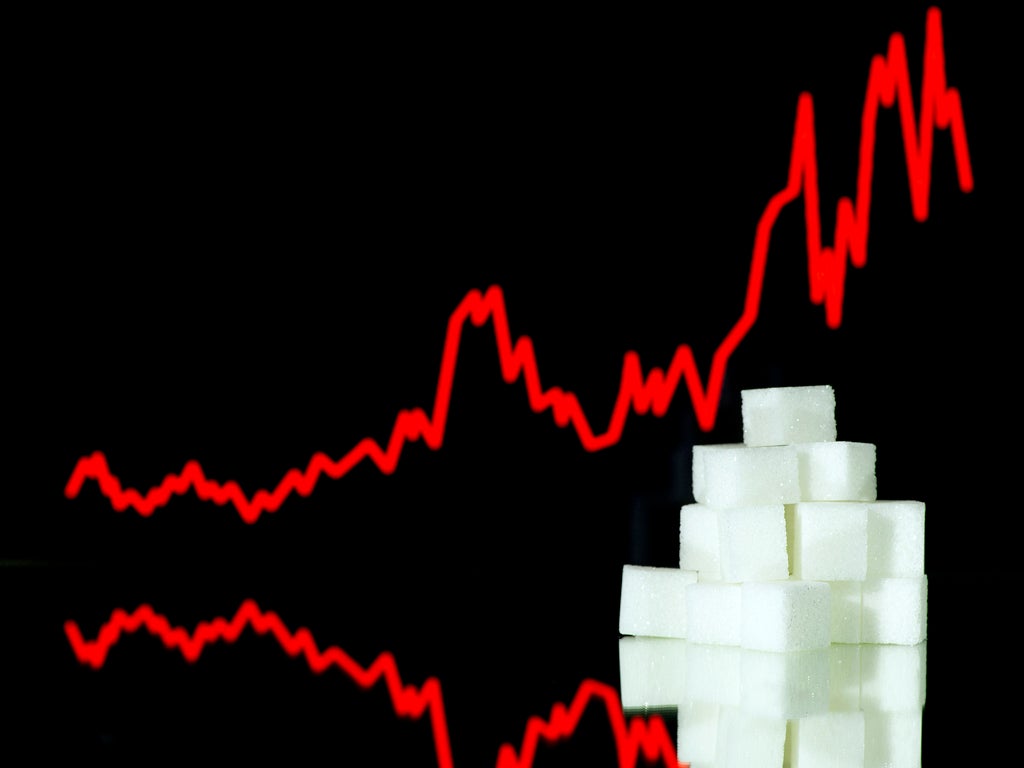Mark Steel: Worried about what all the sugar in supermarket foods is doing to you? Don't be. At least it's not beef dripping
Sugar is in everything. Soon tap water will be flavoured with melted Yorkie bars


The World Health Organisation has said sugar is the “new tobacco”, making us fat and useless, so now the experts are wondering how this could possibly have happened.
But one cause that may have contributed is that sugar is now in everything. Bread is full of sugar and soup is full of sugar and soon carrots will be full of ice cream and tap water will be flavoured with melted Yorkie bars, and new cereals are launched with adverts that go: “Everyone’s asking why new Sweetypops are so pop-pop-popular. They’re solid sugar lumps deep fried in treacle fat and glazed with concentrated Jaffa cakes then coated with five kinds of maple syrup and a doughnut. Scientists have said one bowl could contain up to 73 per cent of daily recommended goodness particles, and Sweetypops now come in new raspberry flavour, so it even counts towards your five a day.”
The staff at coffee shop chains are instructed to ask everyone “would you like a muffin with that?”, with a sorrow that makes you feel they’ll be whipped if you don’t have at least seven.
And everyone offers you chocolate. At one point, if you bought a Daily Telegraph in WH Smiths, you were told this entitled you to a half-price giant-size Toblerone, so whole villages in Surrey must have flooded as nutty dribbles oozed out of angry mouths spluttering about the need to bring back National Service. It’s everywhere. I expect if you go to B&Q now you’re asked: “Would you like a cinnamon bun with your shelving brackets?”
And the pressure on children is even greater. Supermarkets pack the checkouts with crisps and sweets and signs saying: “Hey kids, if your parents really love you they’ll buy you our special offer life-size chocolate baboon – eight stone of pure creamy ape happiness. If they don’t let you have one, it means you were adopted.”
The executive of Tesco interviewed on the news agreed that something must be done about this impending sugar disaster, as if the supermarkets have played no part in causing it. Maybe someone sneaks into branches of Tesco at night, and every morning the manager arrives and says: “Oh not again. There are three aisles of extra-sugary-super-sweet flagons of Coke. When I left yesterday they were full of fresh fish.”
Asked whether he thought there should be legislation to resolve the issue, the Tesco executive said they were already dealing with it voluntarily. Of course they are. They might make billions out of promoting food packed with unnecessary sugar but for Tesco the priority is keeping children healthy. Then at the shareholders’ AGM the chief executive will announce: “I have excellent news. This year we’ve sold hardly any biscuits or fizzy drinks, so there are no dividends to any of you, but now kids can jump around in sandpits instead of collapsing in a wheezy diabetic fit because their body is 60 per cent cream soda” and everyone will cheer.
Tomorrow there will be an item on the news in which a crack dealer assures us he’s doing all he can to reduce the crack content of crack, as his main concern is the health and well-being of his customers.
Some experts dispute the concerns altogether. In particular, a research body called Sugar Nutrition UK claims there’s no evidence that added sugar does us harm or is linked to obesity, and it must be coincidence that this group is funded by the manufacturers of sugar.
Their impartial opinion is that if added sugar in food such as pasta sauce is reduced, “the sugar will need to be replaced by another ingredient that may contain more calories than the sugar”. This is clearly true, if the item you replace the sugar with is a bucket of beef dripping.
The same goes for ready-made chicken kievs. It may contain six spoons of sugar, but if you took that out and stuffed it with a tray of used oil from a chip shop’s deep fat frier it could be even more unhealthy, so it’s best to leave it as it is.
One possibility could be to replace the added sugar with nothing, with a similar technique to that used by people who give up having sugar in tea. Usually, when someone does this, they cope with nothing in their tea, and don’t feel the need to replace the sugar with something else such as a bucket of chicken nuggets.
Sugar Nutrition UK may object that insufficient research has been carried out on the effects of nothing, with philosophers still uncertain as to what nothing actually is, which means there could be harmful side effects worse than the relatively benign epidemic of heart disease their product is responsible for.
The free market being what it is, they’ll probably get their way, though you might wonder if it’s a coincidence that these bodies with scientific-sounding names that are funded by companies that make things always conclude that the things they make are excellent and safe and don’t need to be curtailed at all. There’s probably an organisation called Breaking and Entering Research UK, funded by the nation’s burglars, that will produce a report that goes: “There is no evidence that having your belongings stolen makes you any poorer, or reduces the number of belongings you have in any way, as long as you get robbed as part of an overall balanced diet, which of course we fully recommend.”
Join our commenting forum
Join thought-provoking conversations, follow other Independent readers and see their replies
Comments